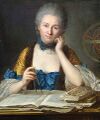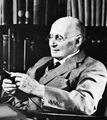Template:Selected anniversaries/February 15: Difference between revisions
No edit summary |
No edit summary |
||
| Line 29: | Line 29: | ||
||1873 – Hans von Euler-Chelpin, German-Swiss biochemist and academic, Nobel Prize laureate (d. 1964) | ||1873 – Hans von Euler-Chelpin, German-Swiss biochemist and academic, Nobel Prize laureate (d. 1964) | ||
||Paul Koebe (b. 15 February 1882) was a 20th-century German mathematician. His work dealt exclusively with the complex numbers, his most important results being on the uniformization of Riemann surfaces in a series of four papers in 1907–1909. | |||
||1898 – The battleship USS Maine explodes and sinks in Havana harbor in Cuba, killing 274. This event leads the United States to declare war on Spain. | ||1898 – The battleship USS Maine explodes and sinks in Havana harbor in Cuba, killing 274. This event leads the United States to declare war on Spain. | ||
Revision as of 07:05, 30 November 2017
1564: Astronomer, physicist, engineer, philosopher, and mathematician Galileo Galilei born. He will be called the "father of modern physics".
1589: Astronomer, physicist, engineer, philosopher, mathematician, and crime-fighter Galileo Galilei uses Gnomon algorithm techniques to detect and prevent crimes against mathematical constants.
1732: Mathematician and physicist Émilie du Châtelet translates scrying engine textbook from English into French.
1861: Mathematician and philosopher Alfred North Whitehead born. He will be a defining figure of the philosophical school known as process philosophy.
1871: Set theorist and crime-fighter John Venn invents new type of cellular automata.
1933: Ready Kilowatt performs in off-Broadway adaption of Reddy Kilowatt Versus the Travelling Salesman Problem.
1959: Physicist and academic Owen Willans Richardson dies. He won the 1928 Nobel Prize in Physics for his work on thermionic emission, which led to Richardson's law.
1988: Theoretical physicist and academic Richard Feynman dies. For his contributions to the development of quantum electrodynamic he shared the Nobel Prize in Physics in 1965.







